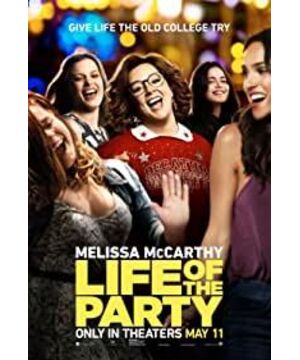As one of the few comedy sisters in Hollywood who can be alone, Melissa McCarthy has quickly become popular since "bridesmaids" with her kind and goofy personality, and has surpassed other "bridesmaids" early on the star journey. : Christine Wig, Maya Rudolph, and even Rose Byrne. Although the evaluation of guest starring in film and television works is always higher than that of her starring role, this does not prevent North American audiences from loving her.
Nevertheless, her husband and wife files with her husband Ben Falcone can hardly be regarded as complementary. Throughout the movies starring Melissa McCarthy, the more watchable ones are often directed by Paul Feige, the director of "Bridesmaids" ("Female Spy" and "Hot Police Flower"), and the more bland ones are often directed by Ben Law Ercone went into battle on his own ("Female Boss" and "Tami"). It is neither as good as Jared Apato nor Paul Fegg. From these movies, we can find that Ben Falcone has a huge shortcoming in script creation: lack of dramatic conflict that can be carried through from beginning to end. The characters and story arcs are extremely flat. This makes ideas with a certain potential stretched into a 90-minute feature film and can only be filled with paragraphs.
As far as "Party Life" is concerned, the starting point is the popular woman power of "middle-aged women returning to the workplace to find themselves" in recent years, but the workplace has been replaced by a school. From this setting, we can see many interesting directions, such as wrestling with ex-husbands, communication with daughters, generation gaps in different age groups, and even how to overcome difficulties and regain work/study after many years. But unfortunately, Ben Falcone was very weak in the unfolding of the story. He did not give full play to Melissa McCarthy’s comedic characteristics. Instead, he relied on a few bright spots, and he was delusional that everyone didn’t. I know what I'm doing in an overhead world looking for earth qi.
There is a serious decentralization problem in the narrative of Ben Falcone's film works, which makes "Living on the Body" so lacking in features, and it is difficult for us to classify this film. Is it a female middle-aged crisis film like "Forty Confusion"? It seems to be, and it doesn't seem to be; is it a (pseudo-)old-age school movie like "Return to 17"? It seems to be, and it doesn't seem to be. In essence, "Family Life" is a film that promotes sisterhood and inter-generational respect. It is the opposite of "Neighbors War". Although it is also exaggerated, it is more gentle-even too gentle (a real college comedy) Often more cruel, stupid and vulgar than this). The relationship between the characters between the generations is seriously lacking in credibility (of course, this is not a big problem in a comedy movie), four painless college parties strung together for a year, but in addition to pointing out The plot element of "the son of the ex-husband and the new wife in night clothes" seems to have no other effect. It is not a "life on the body" at all: the relationship between the daughter and the Asian boyfriend is dispensable, and the little girlfriends own it. Youth worries are dispensable, and the existence of emo roommates is dispensable.
As far as perception is concerned, Ben Falcone doesn't seem to have any intention to add any details to the film, but mainly relies on the on-the-spot performance of various actors. When the biggest role of characters and plots is not to enhance the relationship between the characters and promote the narrative, but only to serve a few paragraphs, this is likely to be a very disappointing movie.
But precisely so, "Body Life" also embodies the extraordinary ability of a group of female comedians headed by Melissa McCarthy to interpret far-fetched fragmented jokes. In addition to Melissa McCarthy's absolute role, SNL veteran Maya Rudolph and freshman Heidi Gardner are the absolute protagonists in their respective scenes, and they can attract the attention of the audience almost instantly. The former’s energetic comedy performance is very fruitful, while the latter, as one of the most potential actresses in SNL’s active cast, has a strong shaping power and accurately grasps the time and laughter of each paragraph. Over time, she is in the movie In terms of prospects, it may even surpass several more talented senior sisters like Christine Wig, Tina Fey, Kate McKinnon and so on.
As a result, "Living on the Body" has become a comedy film that is extremely polarized. On the one hand, a large number of over-fascinated characters emerge in an endless stream, with few inner changes or any subtle things, and nothing serious and beyond expectations (Christina Aguilera’s cameo is no suspense). But on the other hand, this movie did not try to bring any tension to the audience, but fully trusted Melissa McCarthy’s personal comedy abilities (of course, she is indeed very capable), so that she can also be like Steve Martin, like Kim Carey, has made drastic decisions in the setting of ridiculous tone. Only by his personal charm and body language, he can win at the box office.
But for her personally, Melissa McCarthy still needs a clear concept film, such as "Female Spy" and "Super Expendables", to produce more chemical reactions with the same outstanding comedians, and even It is some more low-key, more realistic attempts (such as "Saint Vincent"). The collaboration with Ben Falcone always feels like a waste of her time and ours. Melissa McCarthy is far worthy of a better partner, and also needs a better partner.
View more about Life of the Party reviews











